Beyond the Buzzword: Lamington Group’s Blueprint for Sustainable Hospitality


Synopsis
With the introduction of the Digital Markets, Competition and Consumers Act (2024), businesses face significant fines for misleading environmental claims. While intended to provide reassurance to consumers, this has led many to stay silent about their sustainability efforts for fear of getting it wrong. Yet, with the climate emergency and overuse of resources, access to transparent information has never been more vital in raising the bar.
Action Speaks Louder Than Words
With the introduction of the Digital Markets, Competition and Consumers Act (2024), the Competition and Marketing Authority has been given power to impose significant fines on any business found to be making misleading environmental claims. Although designed to provide rigour and reassurance to customers, businesses are now choosing not to share their sustainability credentials for fear of saying the wrong thing. However, with the current climate emergency and the reality of over-resource use, access to transparent information is more important than ever to raise the bar.
Lamington Group (B Corp), who proudly set up the world’s first hometel brand, room2, is a business with a mission: to redefine the real estate and hospitality sector through its One Planet Living Strategy; committing to designing and operating hometels within the circular economy, pushing the boundaries on guest wellbeing, and targeting to achieve whole life net zero by 2030.
By focusing on Health & Wellbeing, the Circular Economy, and Net Zero, we are not just shaping our own strategy—we are providing a framework for others to follow. The hospitality industry has an opportunity, and a responsibility, to lead the way.
Lamington Group stands apart from many hospitality businesses because it not only operates its properties, but also owns them. This unique position allows them to embed sustainability at every stage—from site acquisition and design to construction and daily operations. With full control over our buildings, we have the opportunity to lead the industry, experiment with innovative solutions, and share our insights with those who have less influence over their properties. This agility enables us to trial new initiatives swiftly, adapt without bureaucratic hurdles, and drive meaningful change on our own terms.
The One Planet Living Strategy aligns with the United Nations Sustainable Development Goals. It integrates social, environmental, and economic sustainability across ten key principles, backed by specific, measurable goals and reported under three pillars: People, Planet and Places.
Within this article, we want to showcase the three principles which underlie Lamington Group’s strategy in the hope of encouraging other hospitality leaders to do the same. Through focusing on Health & Wellbeing, Circular Economy and Net Zero, we want to prove that it is possible to successfully combine sustainability and hospitality and share wins as well as failures.
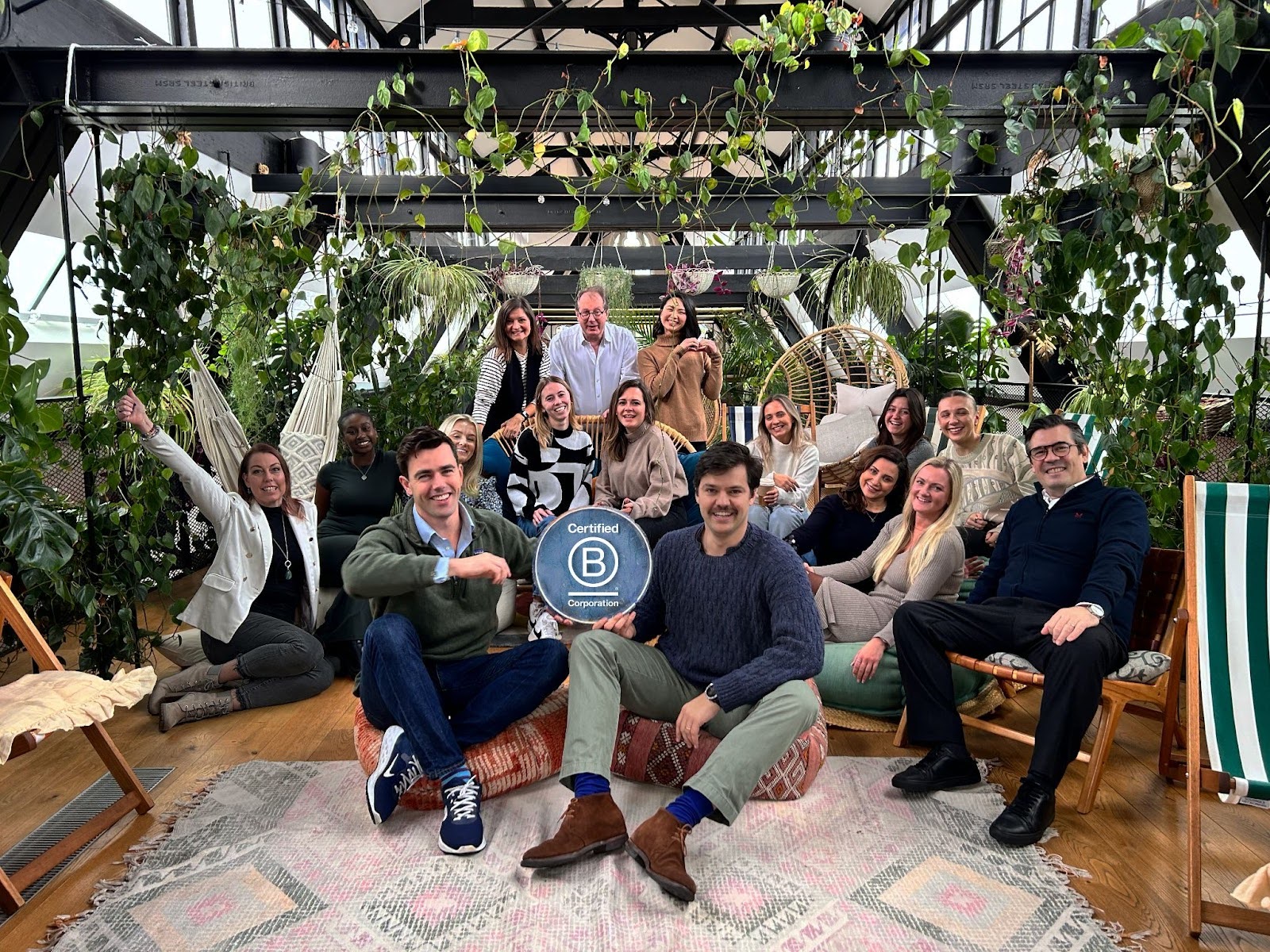
Lamington Group is a certified b Corp
Nov 2023 Lamington Group achieved B Corp Certification
People: Addressing Holistic Health & Wellbeing
Health and well-being has become increasingly important in recent years, though the terms are sometimes used as buzzwords without meaningful action behind them. So, what does it really mean to be a business that supports the health and wellbeing of its guests, employees and its community?
Lamington Group envisions the future of hospitality as one that prioritises well-being, minimises environmental impact, and sets a new standard for a healthier stay. To achieve this, well-being must be considered throughout the entire life cycle of a property—from the first steps in a building’s design to the final moment a guest departs.
At the design stage, numerous certification bodies exist to encourage architects and developers to integrate well-being from the outset. At room2, we are committed to achieving ‘WELL’ certification - one of the highest benchmarks in wellness-focused design - on all future properties. This means our spaces are thoughtfully crafted using natural materials, oxygen-boosting plants, and design elements that optimise air quality, temperature, and humidity for ultimate comfort and health.
Beyond design, operations play a crucial role. Hospitality is fundamentally about people, and sustainability should enhance experiences rather than limit them. That’s why we take a holistic approach to well-being, focusing on three key pillars: social, mental, and physical health.
At Lamington Group, we are passionate about fostering active, social, and meaningful lives to enhance the well-being of our guests, employees, and the communities we serve. From on-site gyms and pet-friendly policies to spaces designed for relaxation, our environments support holistic wellness. Additionally, we are eliminating toxic cleaning products and high-VOC paints, ensuring our properties provide a safe, low-chemical atmosphere.
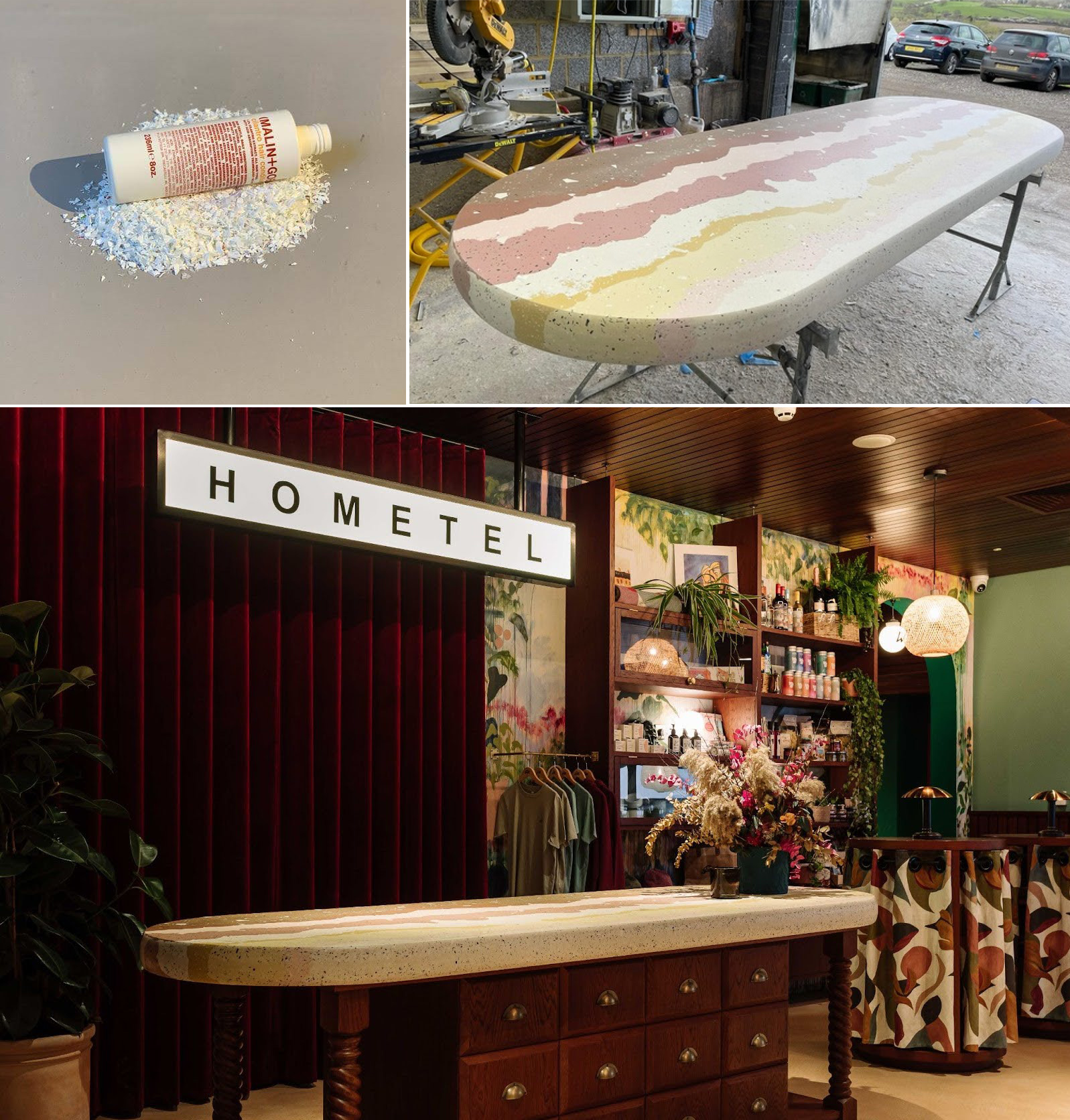
Reception worktop Created by spared.eco.
Recycling shampoo bottles from room2 hometels and turning them into our reception top
Planet: Proving That Net Zero is Achievable
As global temperatures continue to climb, 2024 was recorded as the first year to pass the 1.5C global warming limit despite world leaders vowing a decade ago they would try to avoid this. The urgent need for climate action is clear. With the real estate industry being a major greenhouse gas emitter, Lamington Group is taking action to drive a net zero future.
This led the team at Lamington Group to make a bold but necessary commitment to only build and operate to whole life carbon net zero standards for any new properties. We have launched an ambitious net zero roadmap, and each year voluntarily report and assess our greenhouse gas emissions through a third party. We have noticed that businesses are struggling to get started on their net zero journey, but through being transparent we want to show that true net zero can be a practical reality, rather than an aspirational goal. Each year we publish our sustainability and greenhouse gas emissions reports here.
By designing and operating net zero buildings, businesses have to think long-term to avoid stranded assets. The advantage of this approach is clear: buildings remain viable for longer, operate more efficiently with lower running costs, and retain higher financial value over time.
However, there are several challenges in achieving true net zero design, which we at Lamington Group have faced during our journey. First, whole life net zero buildings are complex to develop and still a relatively new concept. Architects, designers, builders and operating teams must be pushed beyond conventional approaches with clear and ambitious targets.
Second, while emerging low-carbon technologies—such as lower carbon concrete—offer significant carbon reductions, their higher initial costs can be a deterrent for many developers. Yet, when factoring in long-term savings and the reduced need for future carbon offsets, these solutions can become viable and financially sound. Lastly, it's crucial to critically assess products and materials marketed as "net zero." Some may be simply relying on carbon offsetting without delivering real reductions.
All room2 hometel properties are carbon neutral, audited by a third-party (ISO 140064) to ensure accountability. These properties operate on 100% renewable electricity, harness solar energy and leverage smart energy solutions such as occupancy-based lighting, LED technology, and ground source heating and cooling systems.
Data from on-site lab rooms informs ongoing improvements, resulting in an 18% year-on-year reduction in total Scope 1 & 2 emissions since 2019. The message is clear: sustainable operations can be both effective and commercially viable.
Places: The Future of Circular Hospitality
The concept of a circular economy has been around for decades, but making it a reality requires time, investment and dedication.
It is not enough to reduce waste in hospitality by switching to reusable toiletries and asking guests to reuse their towels. Hoteliers need to consider how resources are being used from the design stage to its end of life.
Lamington Group is on this journey and bringing the concept of circular hospitality to life. Our aim is to fully integrate circular economy principles in every aspect of our business, from the choice of building materials and procured goods, to the approach we adopt to turn operational waste into ‘new’ products. This can be seen throughout the hometels, with welcome desks crafted from repurposed shampoo bottles, carpets woven from recycled fishing nets, and light fixtures created from orange peels.
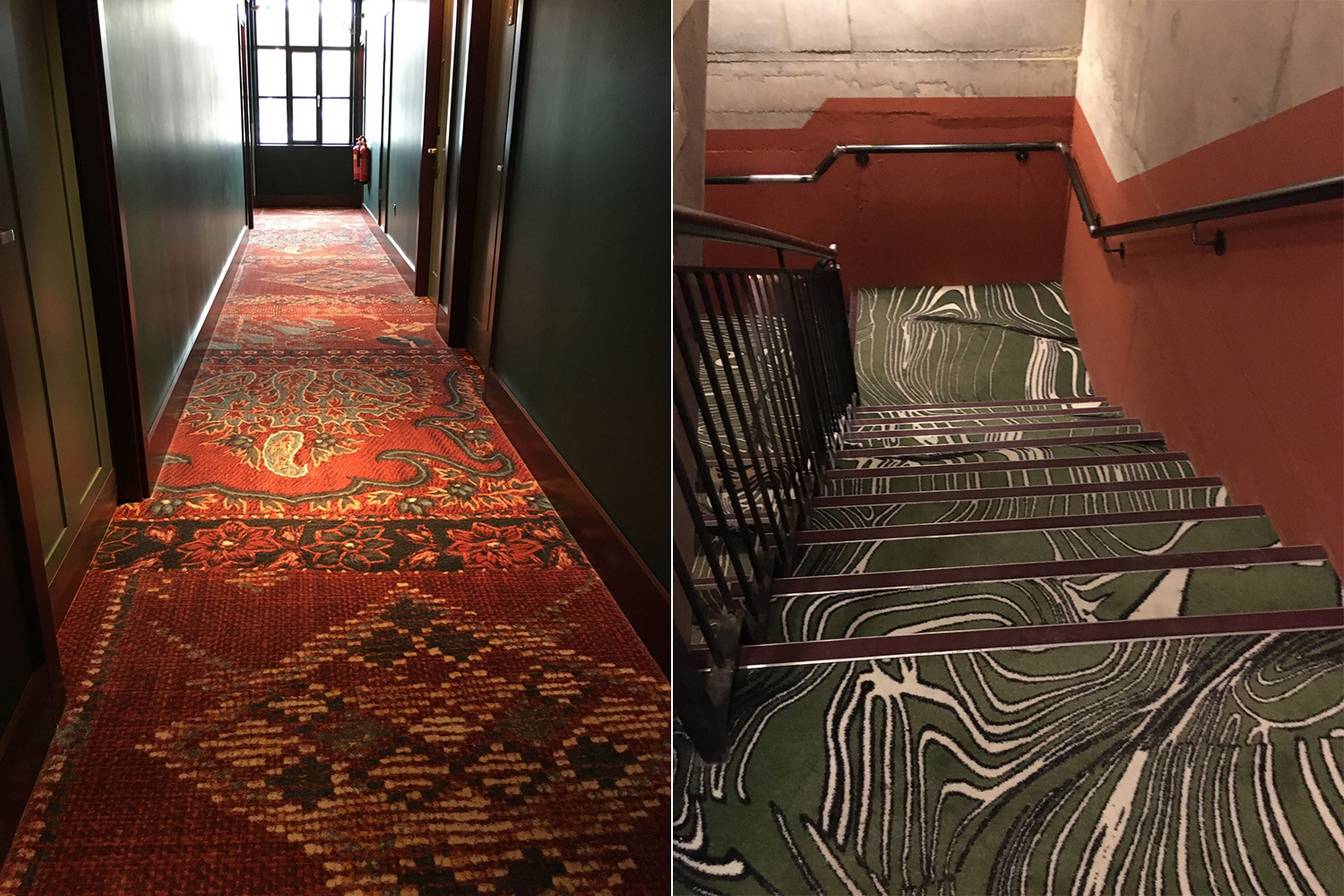
Regenerated Carpet
Cradle to Cradle certified carpets made from abandoned fishing nets and industrial scraps
Our zero waste to landfill policy, also helps us drive our goal forward to reduce our overall waste production. Unlike traditional hotels, room2 hometels offer in-room recycling, facilitated by custom-designed 3-in-1 bins that make waste segregation seamless for guests.
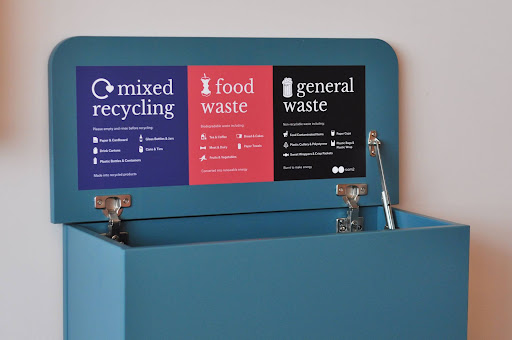
3-in-1 Bins
We didn’t like the bins we saw on the market so we decided to design our own 3-in-1 recycling bins. Separating general waste, mixed recycling, and food waste in one easy place. We are also repurposing waste plastic into coasters and other items using a plastic injection machine, provided by the Sustainable Design Studio.
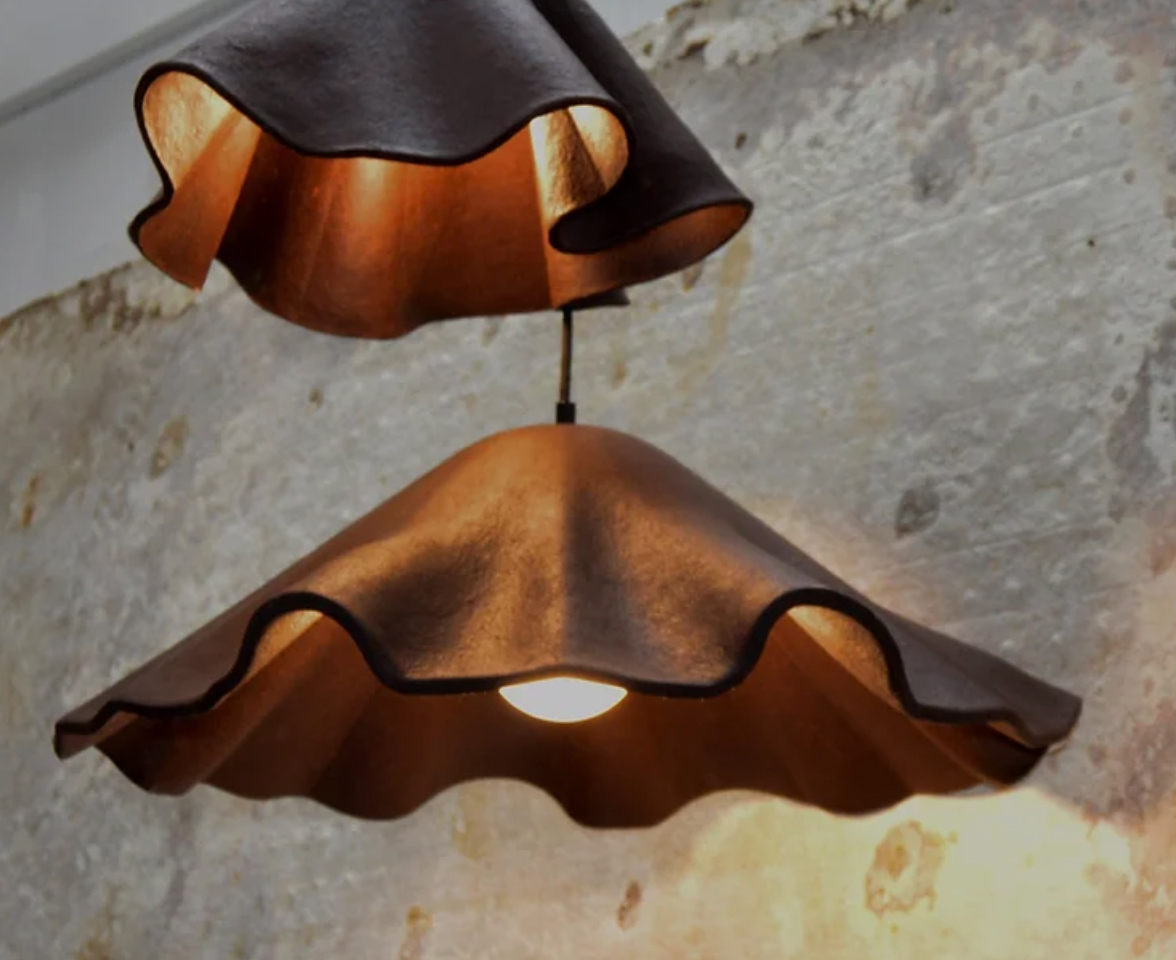
Meeting room Lampshades by BIOHM made with orange waste and mycelium
Guided by our sustainable design principles, we prioritise natural, local, high-quality and circular materials and products that showcase talented people in each community.
From partnerships with local artists to bespoke craftsmanship, our spaces celebrate creativity and culture.
Our properties are more than just places to stay - they are thoughtfully designed spaces that are connected with each community they inhabit. By creating places that bring people together and encourage responsible interactions with the environment, we contribute to stronger, more vibrant communities.
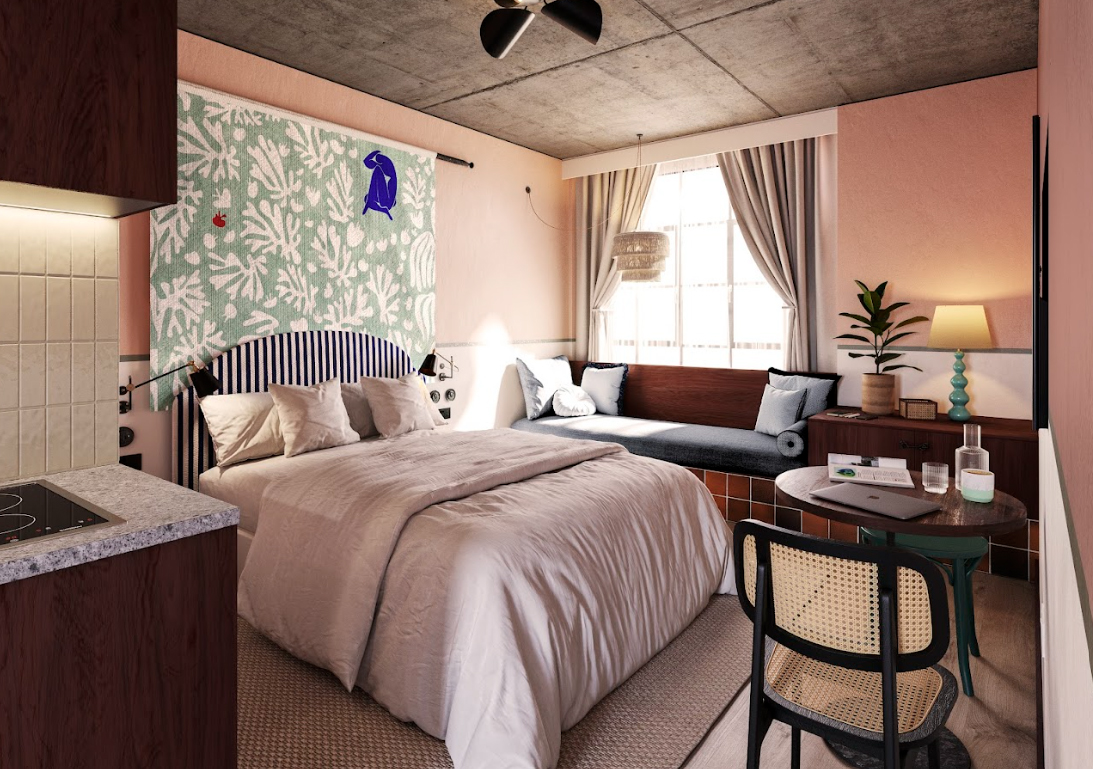
Room
Two ‘lab rooms’ which provide real-time granular information on energy and water use as well as air quality. Don’t worry, it’s not big brother watching you! Learnings from these ‘labs’ can be used to see how sustainability interventions work for test the efficiency of new appliances.
Thinking Ahead
To drive meaningful change, we've been researching how cities across the globe are addressing the climate emergency—and integrating these insights into our upcoming projects. By combining these insights with our own tried-and-tested approach, Lamington continues to lead the industry, pushing boundaries and challenging the status quo. With room2 York and room2 Manchester in development—and more in the pipeline— we have a bold ambition to grow to 5,000 keys by 2030, making sustainable hospitality more accessible across the UK, and showing others how to follow suit.